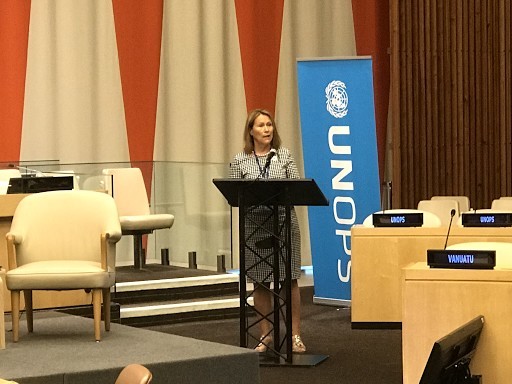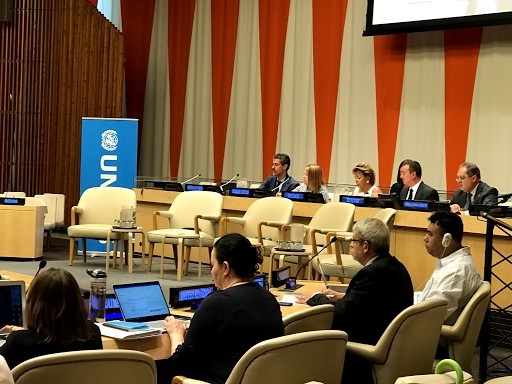The United Nations Office for Project Services (UNOPS)
Accélérer la réalisation des objectifs de développement
Discours de clôture de Grete Faremo, Secrétaire générale adjointe des Nations Unies et Directrice exécutive de l’UNOPS, lors du sommet 2018 de l’initiative IMPACT2030. (en anglais)
[Check against delivery]
Ladies, gentlemen, distinguished participants
I am honored that the organizer asked to make some closing remarks after three days of analysis of the business opportunities of tomorrow.
My name is Grete Faremo and I am Executive Director of UNOPS – which is a unique UN organization which in many ways works much like a private sector entity and at the same time is governed by UN rules.
We are unique in the UN in three ways:
- We only do implementation – no policy role.
- We are headquartered in Copenhagen.
- We are not financed by contributions from any donors. But, are fully self-financed through fees for services.
We charge a small overhead when we deliver services. UNOPS works with partners in both public and private sectors who share a vision of a more sustainable future. With other UN agencies, international financial institutions like the World Bank, directly with national governments, and with foundations and private companies.
Put simply, we translate policy into action on the ground.
This includes building roads, health clinics and schools in places like Afghanistan and South Sudan. We help build schools that make girls attend.
We support governments in delivering healthcare to their populations, through national medical procurement in places like Honduras and Guatemala.
The list goes on.
In total, this all adds up to around 1,000 projects a year in 80 plus countries.
My background is in politics as well as business. Finance, real estate, ICT.
Because of this, I naturally look to the possibilities and opportunities that can be realized when the private and public sectors join forces.
Strong partnerships are a hallmark of Agenda 2030.
So too is innovation! How to drive innovative ways of doing things together with not only our established partners, but grass-root organizations, small businesses and the world’s young people will be key in building opportunities and hopes for a better future for all.
You’ve heard the numbers before.
We all know that there are vast needs for investment if we are to achieve the Sustainable Development goals.
They range from $3.3 trillion to $4.5 trillion per year – mainly for basic infrastructure, food security, climate change, health and education challenges.
Yet the average annual shortfall for developing countries is $2.5 trillion.
These examples demonstrate the scale of the challenges that face us. While the SDGs reflect unfilled needs and great inequalities, they can also present opportunities.
Opportunities for improvement in health, food security, jobs and prosperity – for people and planet – as well as opportunities for those providing products and services; a chance to meet needs beyond local and traditional export markets.
This will also require large infrastructure investments to ensure access to water, transport, and information and communications technologies.
So how can we help address the vast challenges before us?
We know that businesses often cannot succeed in difficult geographies. Private companies tend to go towards the lowest risk and the easiest return.
UNOPS knows difficult geographies. A large portion of our work is implemented in conflict affected and fragile states. We also work in emerging economies.
Private sector has a role to play in providing clean water, transport and climate-resilient infrastructure. UN, or more directly UNOPS, may help mitigate the risk and turn opportunities into bankable projects.
In Sierra Leone, for example, together with the UK’s Department for International Development, DFID, we have been implementing a renewable energy project. It is the first of its kind and scale in the country.
The project is providing up to 5 MWs of sustainable, low-carbon energy to rural communities through the installations of power stations and mini-grids.
But what helps make this unique and sustainable in the long-run is the integration of the private sector.
Local companies were invited to tender their services to run the completed power supply networks in each village. This was a competitive process.
These firms thus assume responsibility for long-term operations and maintenance, which provides opportunities for employment and bolsters the local economy.
This is but one example, but it highlights the importance of bringing local companies and local businesses into our work.
We call it our Social Impact approach when we as UN entity invest part of our financial reserves in projects jointly with public and private partners.
Thus, we just recently invested 8.8 million dollars of UNOPS own financial resources, to revitalize a “stranded” project to bring clean energy to communities near Monterrey in Mexico.
By recapitalizing and operating a 22 MW wind energy farm, we will promote climate-smart infrastructure, support local economic development, and help Mexico deliver on its ambitious targets in energy reform and renewables.
This project would probably have remained stranded if we had not helped share the risk of investment, making a non-bankable project bankable. In total, 31.6 million dollars was needed to secure this project.
The bulk of this investment - more than 22 million dollars - will be refinanced by BancoMEXT, the Mexican Development Bank.
With UNOPS involvement, the project will be able to produce green energy at a lower cost for 50,000 individuals, and secure jobs.
The project site also operates a free learning centre for school children. They travel from all over the country to learn about the benefits of renewable energy.
Currently, we are exploring other potential, additional investments in Ghana, Kenya, Myanmar, India, Mexico, Honduras and in the Caribbean, amongst others.
This is a new role for a UN entity. But it showcases new ways of working in partnership to unleash more resources than would have been the case without us exploring this new model.
So, I invite you to keep an eye of news trends in the working methods and business models of international organizations such as UNOPS.
We may also provide business with knowledge of country-specific conditions, national legislation and local business context which can have a high value a partner dialogue. UNOPS has valuable expertise in how to clean out corruption through fair and transparent business processes.
Overall, the message is clear: To accelerate the achievement of the Sustainable Development Goals, we need strong partnerships. And your presence here today says a lot about business interest in moving forward and finding new opportunities










